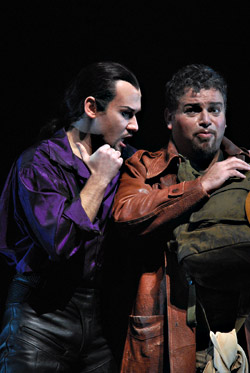Director Chris Alexander has kept the time and place purposefully vague in his sleek, chic, colorful production of Mozart’s Don Giovanni: modern dress for most of the characters against 18th-century livery for the extras playing footmen; a mausoleum inscribed in Italian, with palm trees in the background; party guests who frug as the orchestra plays a minuet; a high-tech video screen for the Don’s apartment; and a servant who still records his conquests by hand in a book (“treeware,” I believe they call it).
True, the updating in this Seattle Opera production makes nonsense of the story’s class-conflict aspect—we don’t seem to be in a realm where the Don’s noble blood would intimidate anyone, including the “peasant girl” Zerlina he tries to bed on her wedding day. But the opera’s core question—why do women love bad boys so much?—remains unaffected by tinkering with the milieu. This Don, a preening metrosexual as played by the seductive-sounding baritone Mariusz Kwiecien, is particularly bad—a borderline sociopath who in the first scene stabs a man in the back (as opposed to besting him in a fair sword fight, as the scene is traditionally staged), and who goes downhill from there.
But a Don so dark throws everything off: Donna Elvira, who loves him in spite of everything, starts to look like a serious masochist, despite Marie Plette’s thoughtful efforts to balance comedy and pathos in the role, while Donna Anna (Pamela Armstrong) comes across as a pure (and less interesting) victim, rather than a fellow seducer with wiles of her own. Armstrong and Plette both sounded a bit unsettled in their showpiece arias—rushed, rather than supported, by conductor Andreas Mitisek’s tempos.
On the other hand, Donna Anna’s fiancé, Don Ottavio, one of opera’s most notorious stuffed shirts, came off as more than usually sympathetic; it helped that tenor Richard Croft was Kwiecien’s match in vocal beauty, offering a performance of the challenging aria “Il mio tesoro” as affecting as it was impressively fluent. Ailish Tynan as Zerlina also brought great charm to her folk-tune numbers, and Kevin Burdette was virile and likable as her fiancé, Masetto. Eduardo Chama proved a highly skilled comedian, master of both slapstick and subtleties, as the Don’s dogsbody Leporello.
The adventures of another womanizer, Bill O’Reilly, hit Meany Hall at the Friday night premiere of Igor Keller’s Mackris v. O’Reilly, his musical setting, in baroque pastiche, of the legal texts surrounding the TV pundit’s 2004 sexual-harassment suit. The admittedly inexperienced, laudably ambitious Keller’s major error of judgment, a fatal one, was to draw his work out to a full two hours and 45 minutes, a length he has nowhere near the technique or powers of invention to sustain.
There were seven-and-a-half pages of libretto to get through, and the single line “And just use your vibrator to blow off steam” was set as a full three-minute aria; you get the idea. Keller’s inability to spin a truly memorable melody, while writing in a musical style that’s pretty much all about melody, was another serious drawback. By coincidence, the most successful movement, just as it was in Paul McCartney’s recently released oratorio Ecce cor meum, was a brief, somber instrumental interlude highlighting the oboe.
Stewart Kershaw brought Shostakovich’s searing Symphony No. 11, a musical account of a 1905 czarist massacre, to Benaroya Hall to show off his Auburn Symphony in Sunday’s gala 10th- anniversary concert, with ironic results. Kershaw and the orchestra have raised their playing to such a peak of finesse that some moments in the symphony were emotionally weaker than usual, simply because the players could not quite bring themselves not to play beautifully. They gave the music romantic expressiveness, flexibly nuanced phrasing, and warm luscious tone where numbness, steely rigidity, and pure ice were needed. But the climaxes exploded frighteningly, and the long lamenting viola passages in the third movement were eloquence itself. Chopin’s Concerto No. 2 is all about the piano, with the orchestra mostly engaged in providing self-effacing support for soloist Craig Sheppard’s animated elegance—a purebred cat on a velvet cushion. But in the Shostakovich and in the concert opener, Wagner’s Die Meistersinger overture, the ASO thrust out its chest and rose to the occasion. Their sound had a full-bodied gleam that—yes, since you asked—easily rivaled the Seattle Symphony’s.







